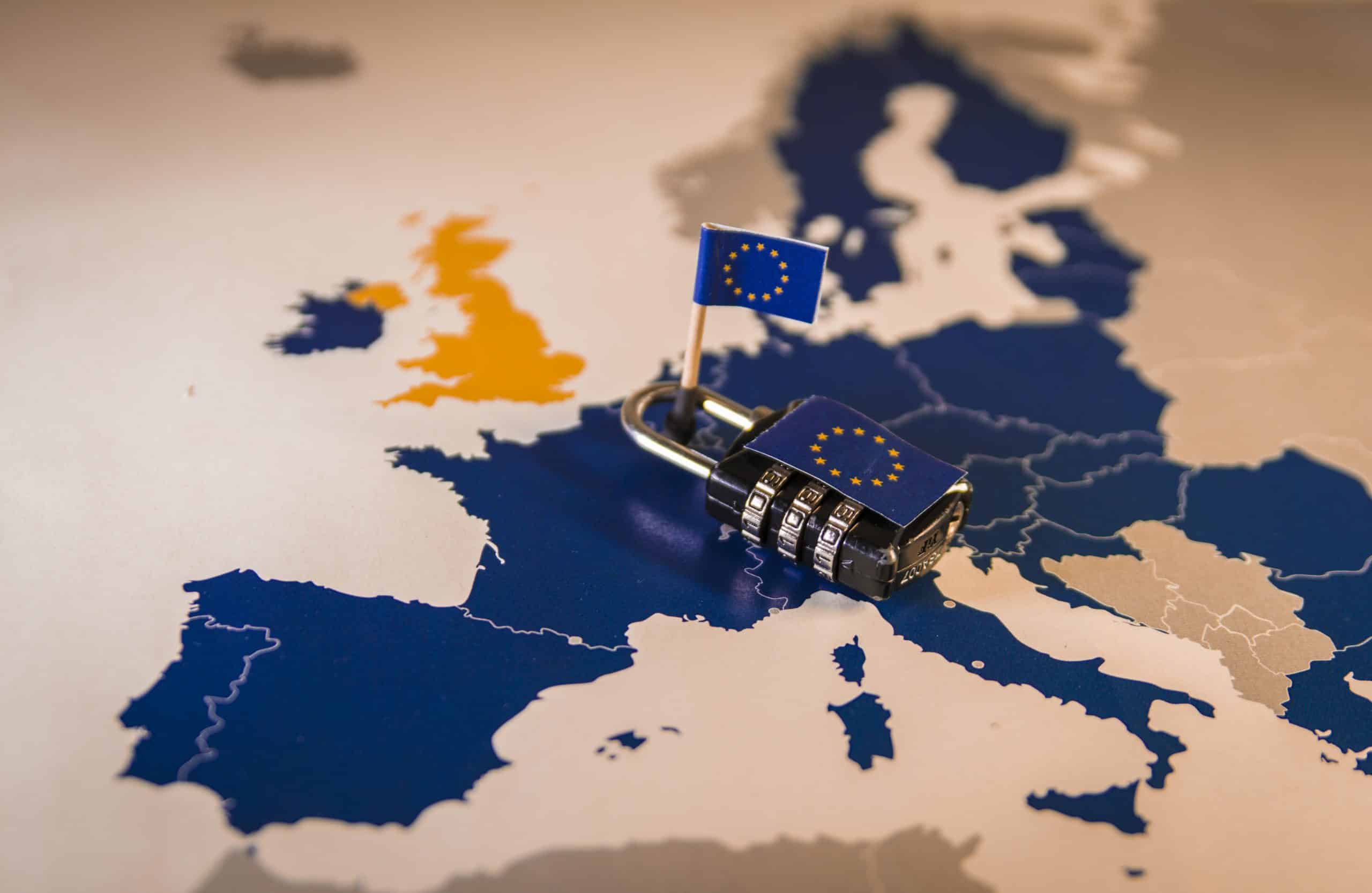You’ve likely heard the term GDPR, or General Data Protection Regulation, discussed for several years now. These days, ensuring compliance with this program is no longer optional, even if your business isn’t based in the European Union.
Since it came into effect in 2018, GDPR compliance has become a requirement for any company handling the data of EU citizens. This has fundamentally changed the way that businesses gather, store, and process the personal information of their customers, employees, and vendors.
Failing to comply can result in significant fines, so it’s worth educating yourself on exactly what GDPR compliance is and how you can stay compliant, whether you’re a small business or a global organization.
Key Principles of GDPR
Originally adopted in Europe in 2016, and rolled out to full effect by May 2018, GDPR is a data protection regulation designed to safeguard the personal information of all European citizens and those within the European Economic Area (EEA) trade zone.
There are six key principles that are the foundation of this regulation and govern how it works, including how personal data should be handled. Breach of these principles is often grounds for non-compliance fines.
1. Transparency
Any businesses collecting personally-identifiable information about people must do so legally, fairly, and in a way that’s clear to those whose data is being collected. In other words, if you’re collecting information about anyone, you must have clear policies that explain what data is being gathered, how, and what you intend to use it for.
Individuals must give their explicit consent in some way for their data to be used. For most companies, this is a big switch from previous data-gathering. Now, everything must be structured as an explicit opt-in rather than simply opting out after discovering that data is being collected. Individuals must also have the option to opt out at a later time, even if they had previously opted in.
2. Limitation
Any data collected must be used only for the exact reason that was stated when it was collected. Without additional consent, businesses cannot use personal information for other purposes.
3. Data Minimization
Not only should the data collected be kept for as little time as possible, the amount of data gathered should be the least amount required for the explicit purpose. Excess or irrelevant information should never be gathered, as this means more information for the company to keep track of and maintain confidentiality for. This is essential for data protection purposes.
4. Accuracy
All personal information gathered must be kept up to date, with clearly outlined processes in place for how to remove data from company systems safely, update any records, or time-out any expiring data.
5. Confidentiality
The biggest factor driving GDPR is data security. This is why businesses must ensure that any data they hold is kept confidential and protected from theft, loss, or unauthorized access. Under GDPR, it’s not only customer data that matters, but employee information, too. Having up-to-date malware security and protections from internal data theft are essential for ensuring that employee data is just as well protected as customer data.
6. Accountability
Every business is held accountable under GDPR and must maintain a paper trail — digital or physical — to prove that the regulations are being followed. Regular auditing of data and keeping records securely stored is essential for maintained compliance.
Rights of Individuals Under GDPR
Under GDPR, there are three main classes of data parties which govern how the regulations work and to whom they apply. These are:
- Data subjects: The individual whose information is being collected.
- Controllers: The organization or business who sets the conditions for what data is collected, why, and how it will be used.
- Processors: An organization responsible for processing personal data.
Under GDPR, what’s considered personally-identifiable information is strictly controlled, as not all information falls under these regulations. In most cases, if an individual could be identified based on the data, it’s governed by GDPR, e.g., name and age data would be covered, but age alone would not be, as this could be thousands of possible people.
There are several key rights that those whose data is covered under GDPR have, including the right to:
- Be informed about data collection: All data subjects must be made aware of exactly how their information is going to be used and how that information was gathered and processed.
- Access: Any data stored by a company must be accessible at all times to the person that the data is from.
- Erasure: Also known as “the right to be forgotten,” GDPR ensures that individuals can have their data completely removed by a company at any point upon request, unless a legal obligation or other mitigating circumstance outweighs this.
- Objection: Individuals can object to their data being gathered and processed at any point, unless there are legal grounds for the company continuing to do so.
- Portability: Those whose data has been gathered have the right to request their data be moved from one company to another.
What Does GDPR Compliance Mean for Businesses?
For businesses, GDPR compliance is typically broken into two distinct categories — those who are based within the EEA and those who aren’t. Simply being located outside the EU doesn’t mean your business is exempt from following GDPR rules.
Businesses based in the EU are likely to fall under these regulations automatically, even just with employee data and no customer data. But for businesses outside of the EU, GDPR can still apply. If the company offers any type of goods or services to EEA residents, even for free, or regularly monitors online activity of EEA residents through online cookie tracking, GDPR compliance is still needed.
As a result of GDPR, businesses must be more defined in why and how data is stored and implement greater security practices to maintain the confidentiality and safety of this information. For larger organizations, hiring a Data Protection Officer (DPO) or someone whose job it is to maintain this data is essential for ongoing regulatory compliance.
Fines are surprisingly easy to receive if your business does not comply. They can run up to 20 million Euros or 4% of global annual turnover, whichever is higher, for the most severe breaches. As of 2025, Meta has had the largest fine so far: 1.2 billion Euros. But even minor non-compliance issues can result in a substantial fine, up to 10 million Euros or 2% of annual revenue, whichever is higher.
Steps to Achieve GDPR Compliance
Companies who will likely be subject to GDPR requirements should follow several key steps to ensure that all information is safely and securely collected and stored for ongoing compliance.
1. Understand what data you’re collecting and why
It’s one thing to collect data, but it’s another to know why and what you’re going to use it for. One of the key principles of GDPR is data minimization, so it’s essential that you know upfront what data you need and for what purpose, to prevent you from holding onto excessive, irrelevant data. You also need to know with certainty who has access to this data and train them on how to keep it safe.
2. Get clear consent
All data gathered must be part of an opt-in system, giving individuals the right to explicitly consent to their data being used. This is why all privacy policies should be routinely reviewed and revised as necessary, so individuals fully understand what is being asked of them and consent can be given freely.
3. Increase security measures
Implementing company-wide security measures is essential for protecting data at every level. This could mean encrypting information stored on company servers, limiting access to the data, and regularly conducting security-focused audits to ensure breach protections are in place.
4. Prepare a data breach response plan
If a breach should occur, it’s vital that the organization has a well-planned response to mitigate the damage and to inform individuals that their data has been compromised. If a plan is being put together when a crisis occurs, it’s too late. A clear incident response plan should be established ahead of time, with clear role assignments for necessary tasks. GDPR requirements state that businesses must report any breaches within 72 hours.
5. Review vendor agreements
If your business works with third-party vendors who may have access to customer data, it’s also important to review what they’re doing to stay compliant with GDPR. Data protection agreements should be built into vendor contracts to mitigate risk to the business gathering the data.
6. Conduct regular audits
GDPR compliance is an ongoing process, so regular audits should be conducted to stay updated with changing regulations.
Tools and Resources for GDPR Compliance
There are numerous options for compliance software on the market today, from those that manage customer data to others that audit your data for overall compliance.
Zendesk
A global helpdesk software, Zendesk manages sensitive user data while maintaining compliance with GDPR. Users can be automatically removed from the system after a set period of time after their ticket closes, and scheduling GDPR updates is quick and simple.
Microsoft Purview Compliance Manager
An addition to Microsoft 365, this tool ensures enforcement of data minimization while performing classification based on data sensitivity levels.
Amazon Macie
This tool uses machine learning and pattern matching technology to find sensitive information stored in business systems and provides automated protections based on data security insights.
Beyond compliance tools, businesses should stay updated on any regulatory changes to GDPR via the official website, the Information Commissioner’s Office in the U.K., and the European Data Protection Board (EDPB).
Common Myths About GDPR Compliance
Understanding GDPR compliance may seem complicated and it’s always best to check with a legal advisor who specializes in this type of compliance if you have any questions. But it’s also helpful to have an understanding of the basics yourself, including some of the most common myths about GDPR.
1. It doesn’t apply to small businesses.
There’s no exemption clause to GDPR — regardless of how big or small your business is, if you collect data from users in the EU, you have to comply.
2. GDPR is only about consent to collect information
Consent is a major principal of GDPR, but it’s not the only aspect of data it covers. Security is also a significant part of this policy, along with providing detailed guidance on what to do in the event of a data breach.
3. If data is public, it’s not considered under GDPR
Regardless of where the data comes from or where it’s held, if it can be used to identify individuals, it must still comply with GDPR.
4. Compliance is a one-time assessment
GDPR compliance is an ongoing effort, which requires businesses to regularly conduct audits on their data storage and security, along with reviewing records that may need to be deleted.
Real-World Examples of GDPR in Action
Within five years of its launch, GDPR has seen hundreds of companies fall victim to breaches, and face hefty fines as a result. Unsurprisingly, the biggest fines have been handed out to some of the world’s largest tech companies, like Google and Meta.
In 2023, Google was fined 90 million Euros by the French Data Protection Authority, CNIL, for non-compliance. Their error? Making it too difficult for users to reject cookie tracking on YouTube, essentially forcing them to give consent to be tracked because it was easier than saying no.
British Airways also faced a substantial fine of close to £200 million in 2019. A cyber hacking incident on their website meant that over 400,000 users were diverted to a malicious site, where criminals were able to steal their personal data.
Key Takeaways
GDPR is not only a legal requirement, but a critical step in building trust with customers, employees, and partners through ensuring responsible data management. By following GDPR best practices and principles, businesses are able to protect personal data more effectively, while also strengthening security measures and avoiding costly penalties for non-compliance.
Frequently Asked Questions (FAQs)
What kind of data is protected under GDPR?
GDPR protects any personally identifiable information that can be used to identify an individual, either directly or indirectly. This includes names, email addresses, phone numbers, IP addresses, location data, financial details, and sensitive information like health records or biometrics.
What are the penalties for non-compliance with GDPR?
Penalties for GDPR non-compliance can be high, with fines of up to €20 million or 4% of a company’s global annual turnover, whichever is higher, for major violations.
Do small businesses need to comply with GDPR?
Yes, small businesses must comply with GDPR if they collect, store, or process personal data of individuals in the EU, regardless of where the business is based. However, some requirements, like appointing a DPO, may only apply to larger organizations.
Can non-EU businesses ignore GDPR?
No, non-EU businesses cannot ignore GDPR if they offer goods or services to EU residents or monitor their online behavior through tracking.



